Archives
-
Vol. 31 No. 1 (2026)
Vol. 31 No. 1 (2026)This issue will be closed and finalized on 31 march.
-
The teaching and learning of mathematical modelling in the Nordic and Baltic contexts
Vol. 30 No. 4 (2025)Jonas Bergman Ärlebäck, Peter Frejd and Suela Kacerja
Editorial: Introduction to the NOMAD 2025 special issue on the teaching and learning of mathematical modelling in the Nordic contextsFloridona Tetaj
”I’m trying to demystify mathematics”: Exploring the goals for teaching mathematical models and modelling in interdisciplinary educationSvitlana Rogovchenko and Yuriy Rogovchenko
Same terms, different meanings: the impact of semantic aspects on biology students’ reasoning in mathematical modelling tasksPamela Helder Naylor and Arne Jakobsen
Investigating in-service Norwegian primary school teachers’ modelling specific pedagogical content knowledgeShaista Kanwal and Ingeborg Lid Berget
Mathematical modelling in Norwegian schools - A study of teachers’ conceptions and practices, and views on potentials and challengesPeter Frejd
Fostering the spirit of mathematical modelling in vocational educationLisa Steffensen
From modelling problems to socio-ecological awareness - The role of reflective discussions in mathematics educationObed Opoku Afram and Said Hadjerrouit
Social affordances in students’ mathematical modelling with digital toolsCamilla Hellsten Østergaard and Britta Eyrich Jessen
A study of the role of data in statistical and mathematical modelling -
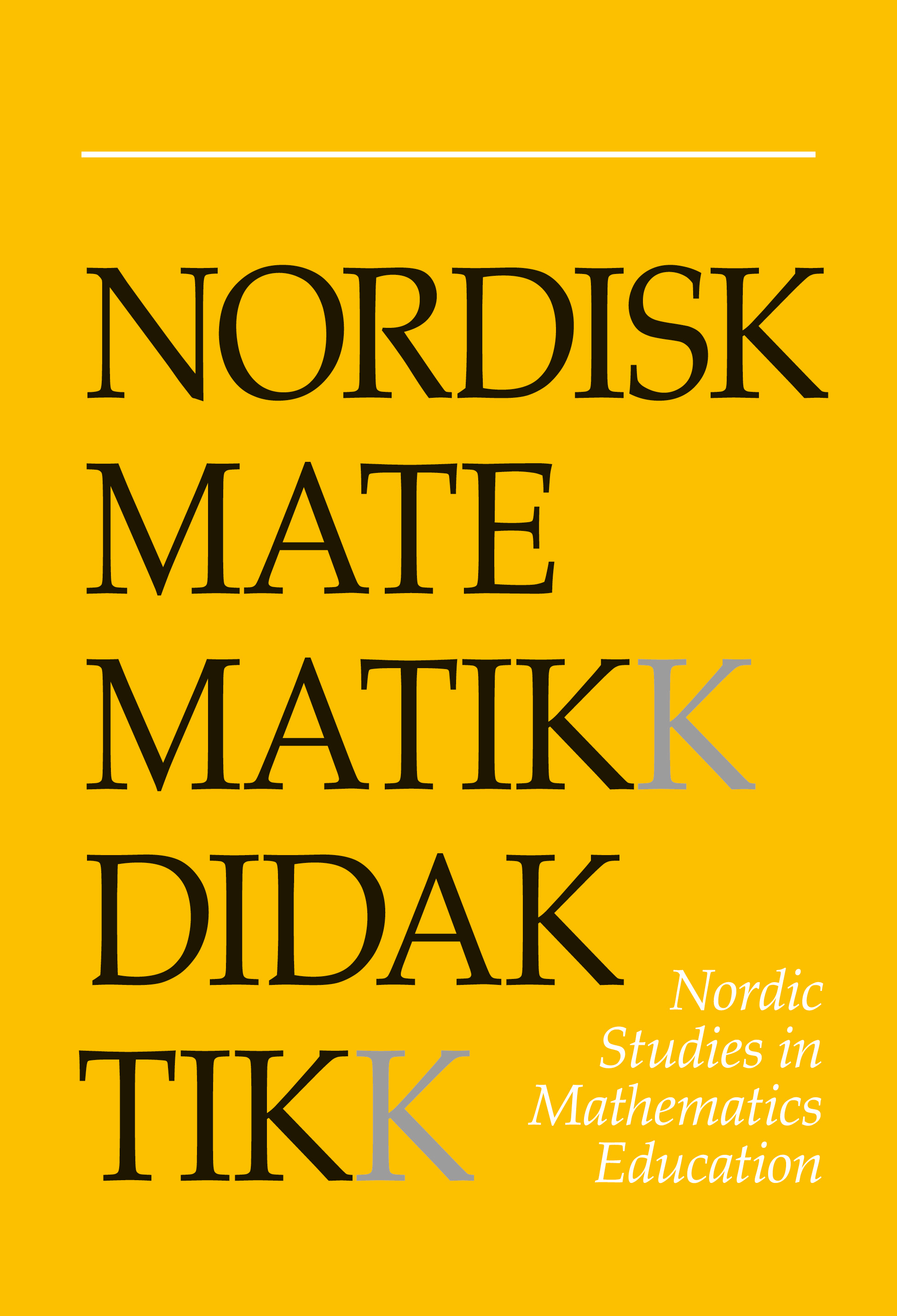
Vol. 30 No. 3 (2025)
Editorial
David Reid
Proof-related competences in Nordic mathematics curricula: a cross-cultural comparisonLinn Flaten
Second graders’ problem solving in a playful inquiry-based mathematics activityMaria Larsson and Jan Olsson
Teachers’ task-specific questions when monitoring students’ combinatorial reasoning in mathematicsOskar Hagvall Svensson, Samuel Marander and Daniel Larsson
”Det är riktat till mig, det borde gå att lösa”: Elevgenererade ledtrådar som stödstruktur vid självständig problemlösning -
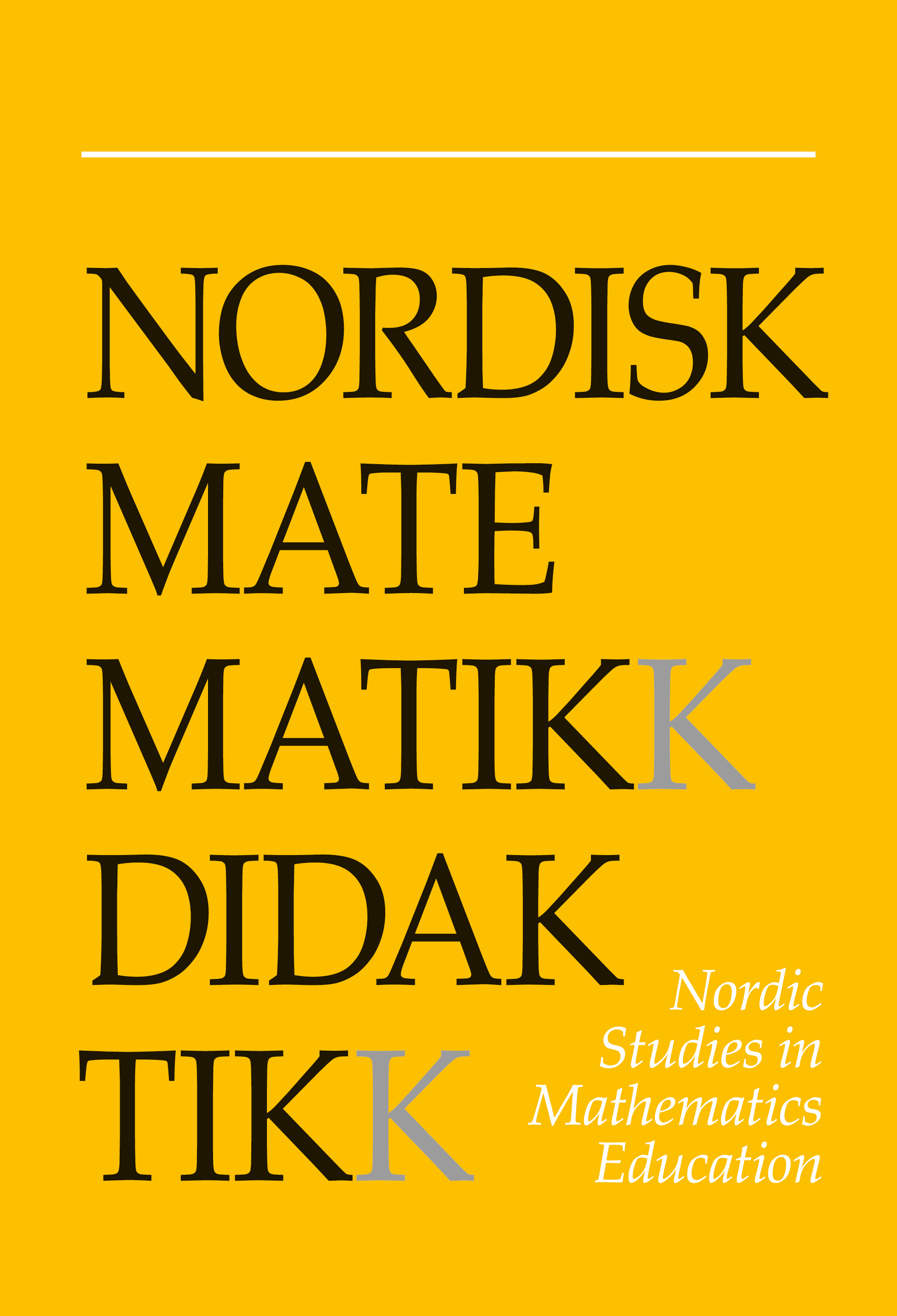
Vol. 30 No. 2 (2025)
Editorial
Angelika Kullberg and Maria Nord
Experiencing part-whole relations of numbers in a partitioning taskMona Vee and Tamsin Meaney
The potential socio-political influences on kindergarten preservice teachers' evaluations of children's use of mathematical digital appsEyvind Briseid, Henrik Forssell and Bjørn Smestad
Triangle and parallelogram area formulas: a critique of teacher education textbooks in Norway -
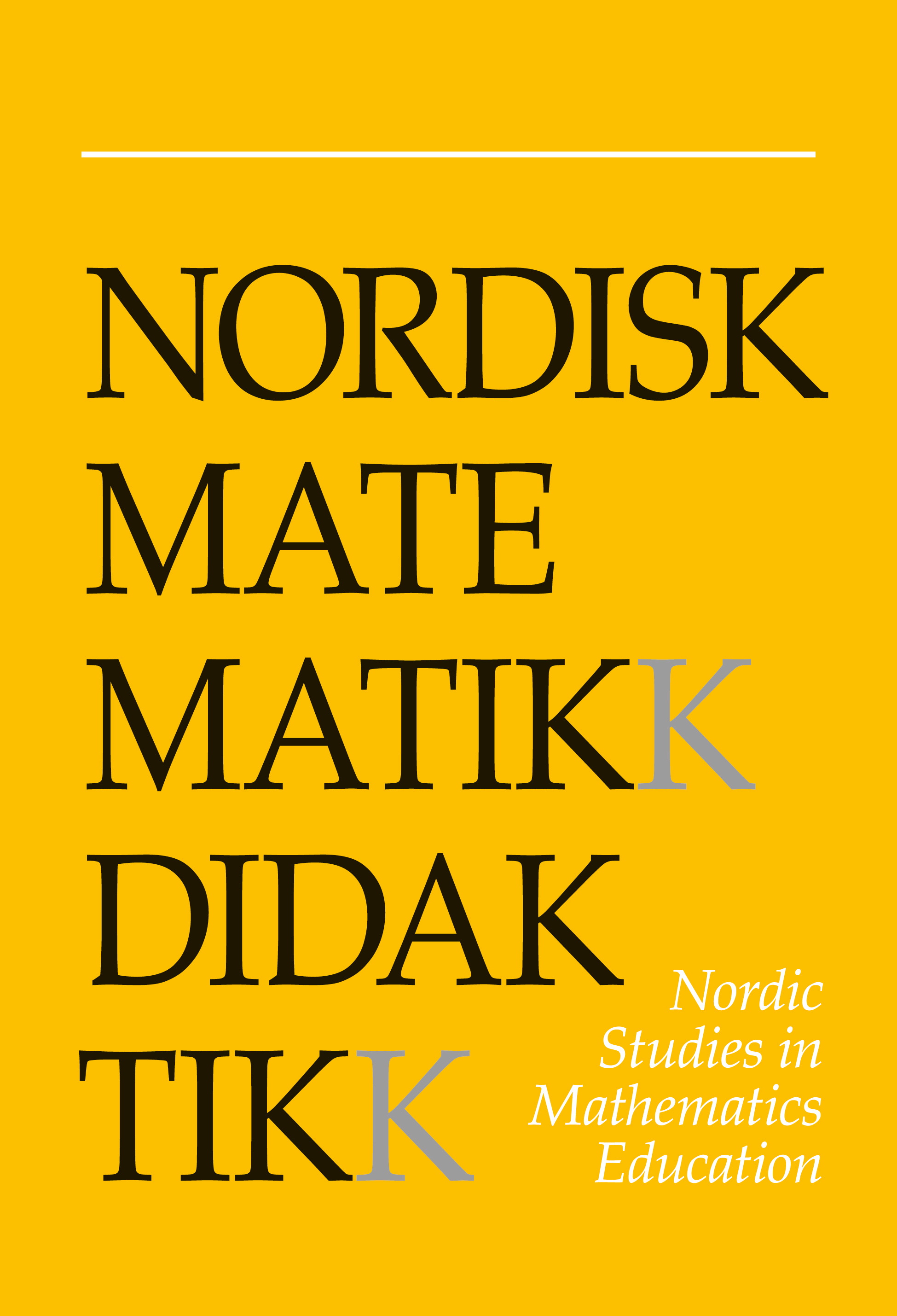
Vol. 30 No. 1 (2025)
Editorial
Maria Herset, Mohamed el Ghami and Annette Hessen Bjerke
Investigating differentiation: exploring the impact of task difficulty labelling on students’ mathematics performancePer Øystein Haavold, Ane Storaas, Marthe Johnsen, Kristoffer Strand and Carina Heimstad
Opportunity to learn in Norwegian and Finnish lower secondary mathematics textbooksPer Blomberg
Preparing prospective primary school teachers in teaching informal statistical inferenceMattias Winnberg
The use of spreadsheet tools in assessment: an instrumented technique perspective -
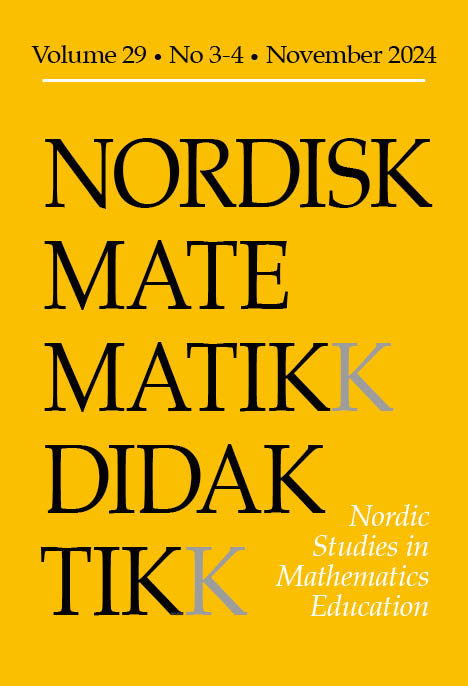
Vol. 29 No. 3-4 (2024)
Jeppe Skott, Sonja Lutovac and Raymond Bjuland
Editorial: Researching mathematics teachers’ professional identities: complexities and ways aheadSonja Lutovac and Johanna Havia
Prospective mathematics teachers’ collective identity work: navigating failure experiences and concerns about relating to studentsEinat Heyd-Metzuyanim and Talli Nachlieli
Professional identities, conflicting positions, and the challenge of conducting mathematical discussions in professional learning communitiesCharlotte Krog Skott and Giorgos Psycharis
Studying how a mathematics teacher’s professional identity shapes and is shaped by the use of digital resources in the classroomRaymond Bjuland, Janne Fauskanger and Reidar Mosvold
Analyzing teachers’ narratives to identify potential impediments of professional development in mathematicsTracy Helliwell and Andreas Ebbelind
Conceptualising (mathematics teacher educator) identity work: an enactivist-informed approachJeppe Skott
Identity as experience – an interactionist approachCall for papers for special issue - Algebraic practice in classrooms and beyond
-
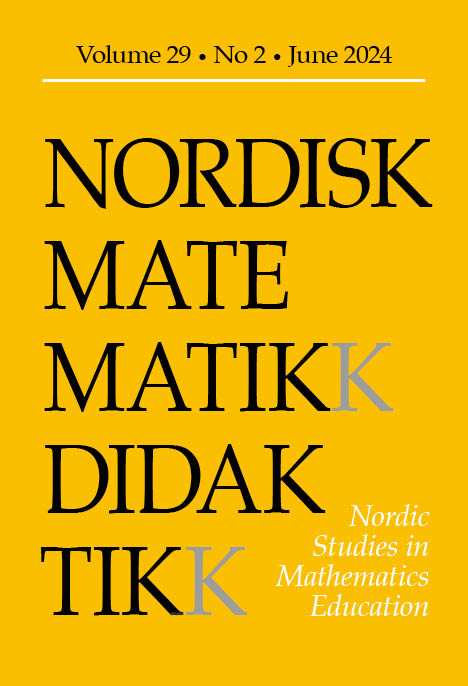
Vol. 29 No. 2 (2024)
Editorial
Jóhann Örn Sigurjónsson
Teaching mathematics with high cognitive activation: instructional formats and connection-making interactions in high-level Nordic lessonsKristin Westerholm and Eva Norén
Lärares erfarenheter av Åtgärdsgarantin i matematik: möjligheter att åstadkomma stödinsatserJenny Green
Primary school students’ engagement in the formative feedback process in mathematics
Green – Appendix -
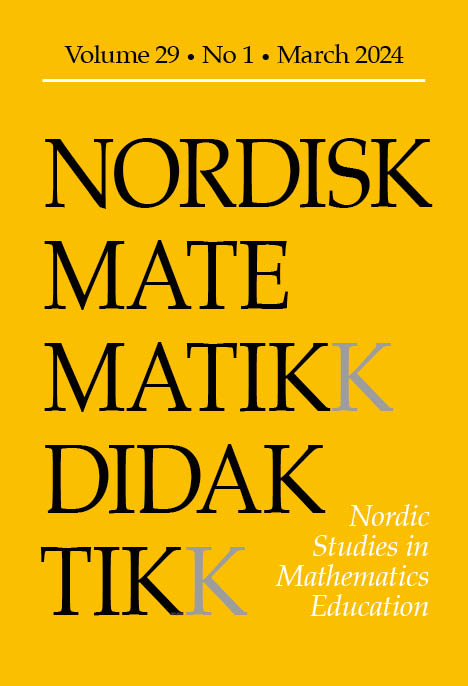
Vol. 29 No. 1 (2024)
Editorial
Niclas Larson
Norwegian student teachers’ perspectives on linear equationsRamesh Gautam and Arne Jakobsen
Challenges in developing a TPACK survey for preservice mathematics teachers in the Norwegian contextMorten Munthe
Facilitating exploratory talk through mathematical programming problems -
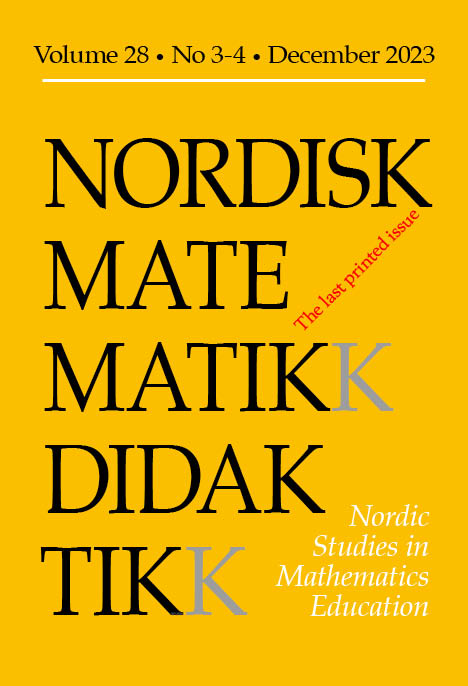
Vol. 28 No. 3-4 (2023)
Editorial
Uffe Thomas Jankvist, Morten Misfeldt, Eirini Geraniou, Mario Sánchez Aguilar and Anna Baccaglini-Frank
Towards a technocritical mathematics educationStine Gerster Johansen
Allgemeinbildung and digital technologies in mathematics education: a reviewFrancesca Granone and Elin Reikerås
Teachers’ support for children’s mathematical learning through interactions while playing with a coding toyMirela Vinerean, Yvonne Liljekvist, Matthias Brandl and Johannes Przybilla
Didactical usefulness of interactive mathematical maps – designing activities supporting prospective teachers’ learninTamsin Meaney, Hilja L. Huru and Mona Kvivesen
Preservice and inservice teachers’ views on digital tools for diverse learners in mathematics educationCecilie Carlsen Bach
A set of design principles for exercising mathematical communication competency when using a DGEIngi Heinesen Højsted
Proof as an explanation of dynamic geometry generated conjectures – task design in a toolbox puzzle approachMathilde Kjær Pedersen
The use of DGE and CAS to support mathematical thinking competency: a literature reviewAndreas Borg and Maria Fahlgren
Analysing mathematical programming schemes using different lensesRaimundo Elicer and Andreas Lindenskov Tamborg
From policy to resources: programming, computational thinking and mathematics in the Danish curriculumBarbro Grevholm
Anna Sierpinska död -
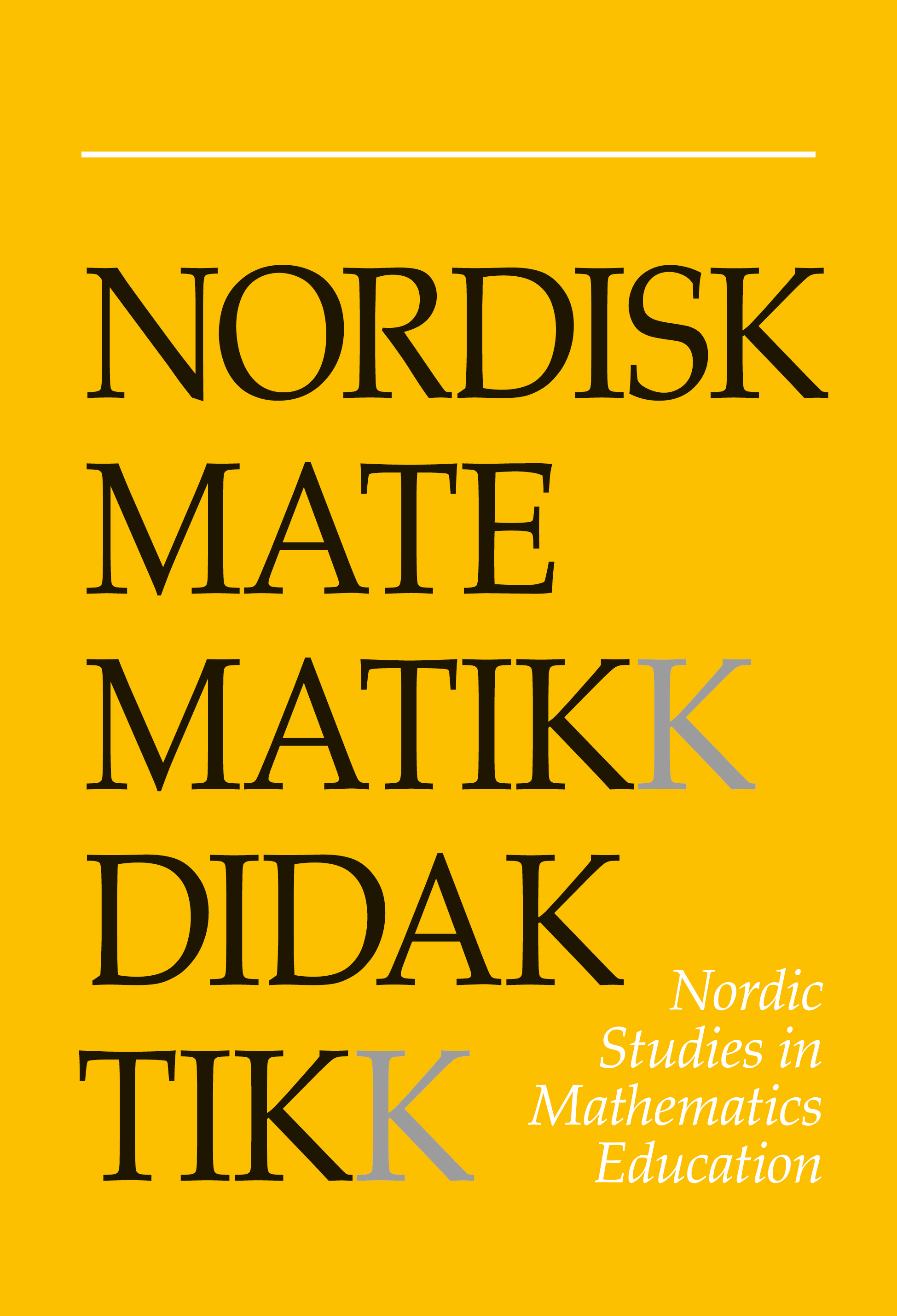
Vol. 28 No. 1-2 (2023)
Editorial
Frithjof Theens, Ewa Bergqvist and Magnus Österholm
Equivalence in multilanguage mathematics assessmentIda Bergvall and Anneli Dyrvold
Mediating activities in students’ collaborative work on self-explanation promptsIngunn Valbekmo and Raymond Bjuland
Students’ reasoned dialogs during problem solving in a Norwegian thinking classroomKjersti Wæge and Olaug Ellen Lona Svingen
Teachers’ learning of ambitious mathematics teaching as changes in pedagogical discourseHilde Opsal and Arne Kåre Topphol
The problematic equal signThematic issue of Nomad 2025 – call for papers
-
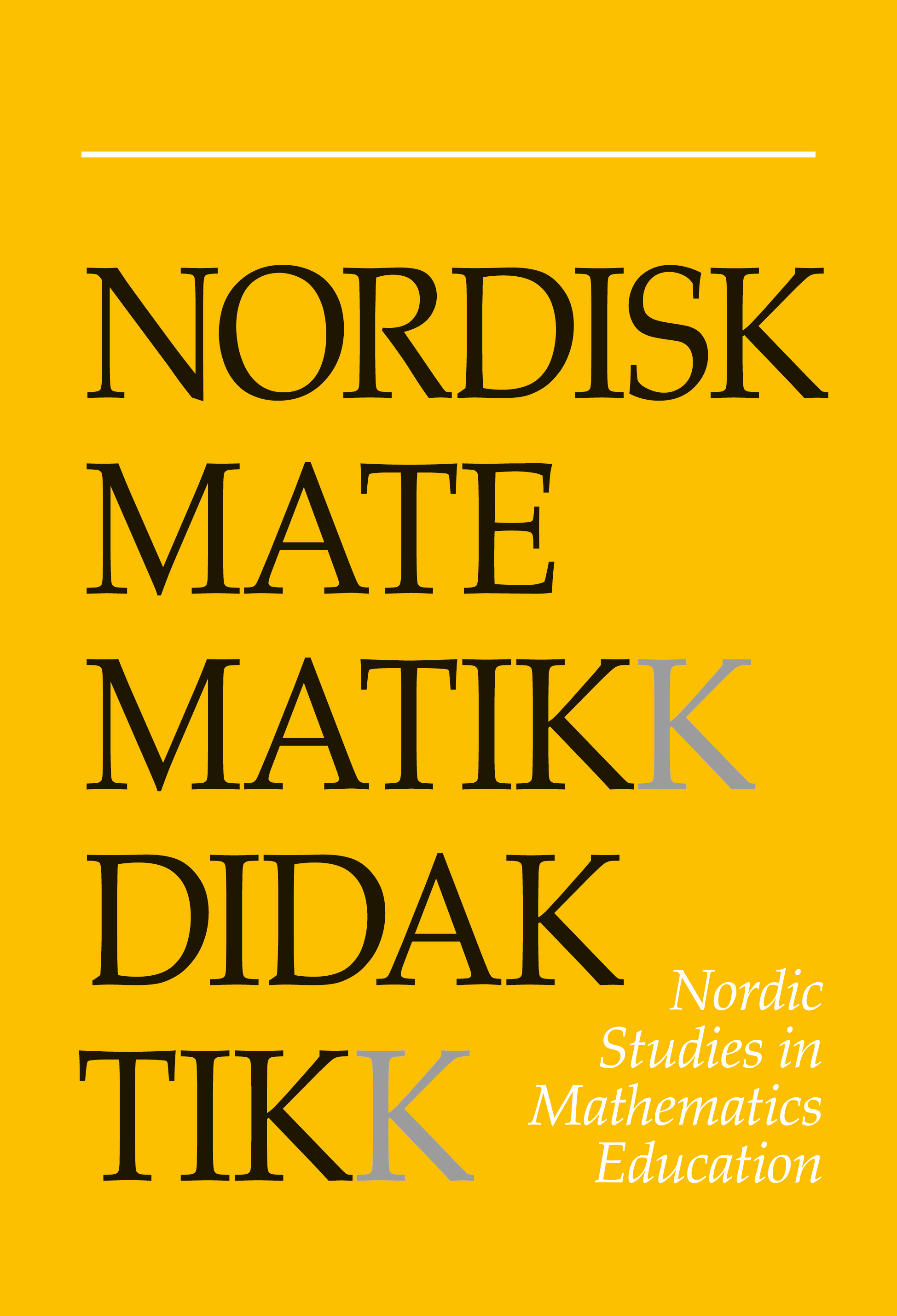
Vol. 27 No. 4 (2022)
Editorial
Salla Pehkonen, Antti Lehtinen, Pasi Nieminen and Markus Hähkiöniemi
Adaptive number knowledge among primary school students of various agesOdd Tore Kaufmann and Andreas Ryve
Transition between discourses – portraying teaching practices in collegial discussions -
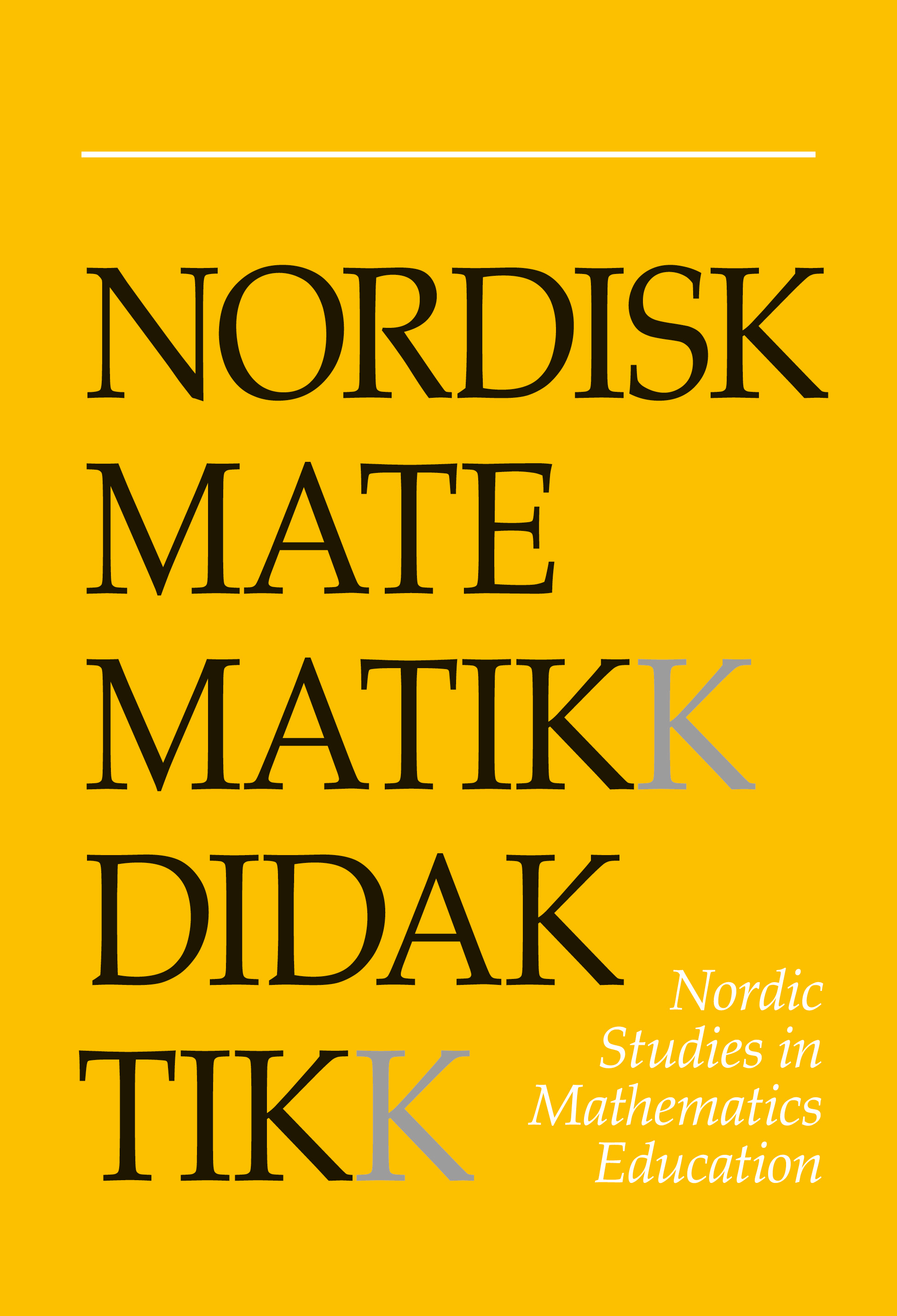
Vol. 27 No. 3 (2022)
Editorial
Kim André Stavenæs Refvik and Annette Hessen Bjerke
Computational thinking as a tool in primary and secondary mathematical problem solving: a literature reviewAstrid Hågensen Kleven
Methods and key findings in research on conversations in early years mathematics: a review of the literatureJonas Jäder
Creative and conceptual challenges in mathematical problem solving -
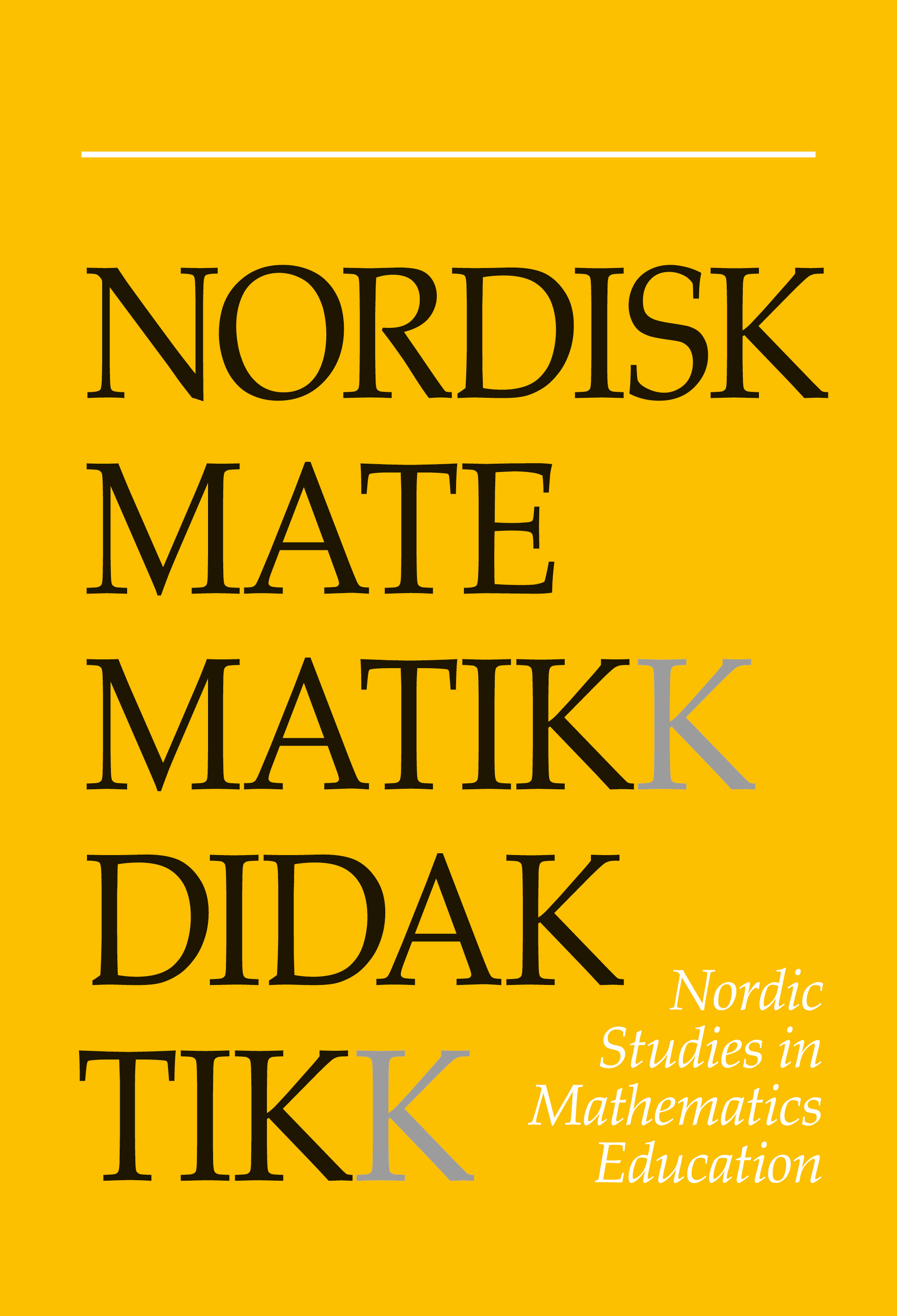
Vol. 27 No. 2 (2022)
Editorial
Camilla Normann Justnes and Reidar Mosvold
Scrutinizing Norwegian kindergarten teachers’ considerations about talk movesMorten Bjørnebye
Full-body interaction in young children’s modelling of counting-based additionAleksandra Hara Fadum og Helga Kufaas Tellefsen
Videreutdanningsstudenters undervisningskunnskap relatert til likhetstegnets betydning i algebra -
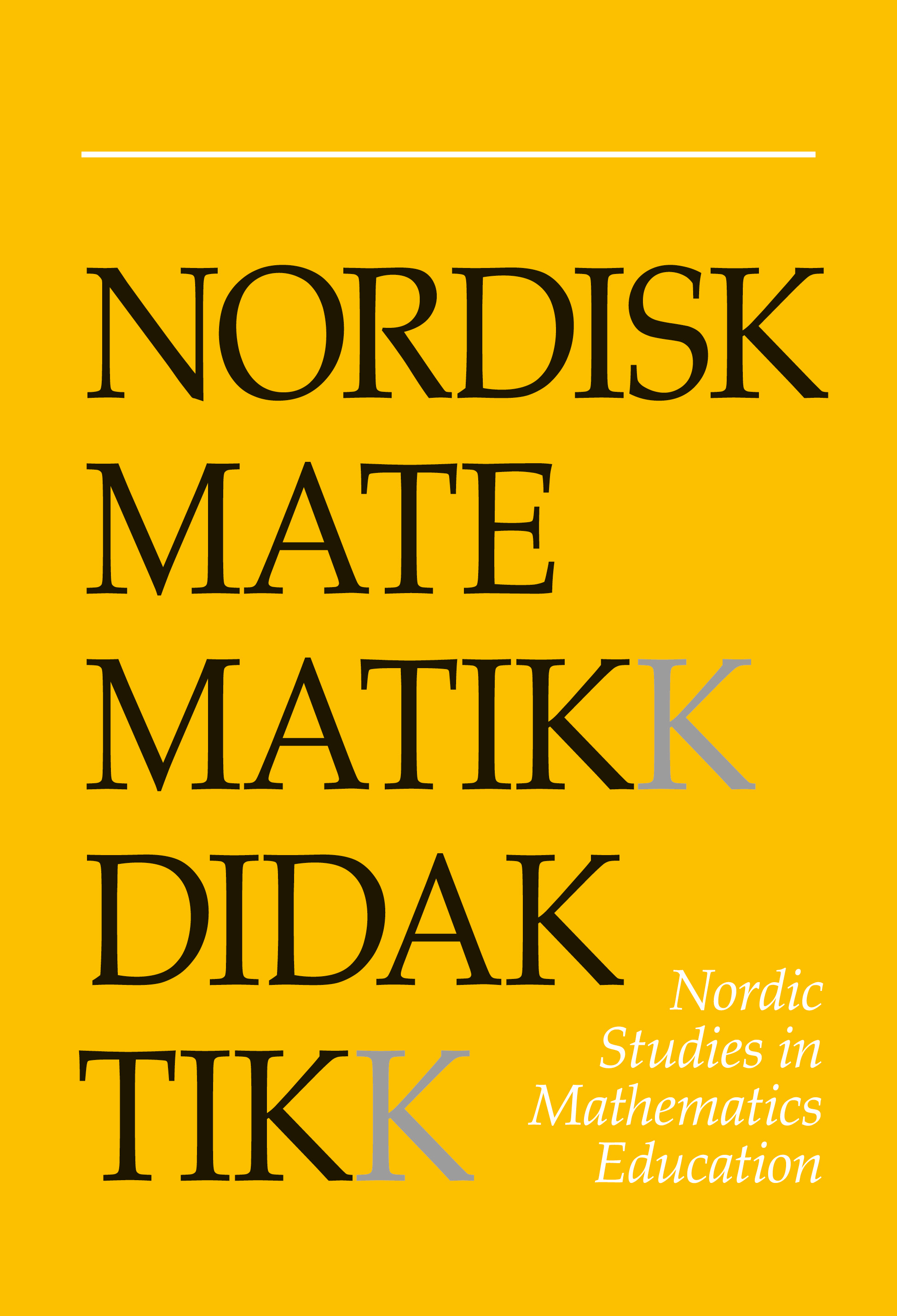
Vol. 27 No. 1 (2022)
Editorial
Tomas Bergqvist and Mathias Norqvist
Creative and algorithmic reasoning – the role of strategy choices in practice and testJan Olsson and Denice D’Arcy
Students’ reasoning and feedback from a teacherIngeborg Katrin Lid Berget
Mathematical modelling in textbook tasks and national examination in Norwegian upper secondary schoolOla Helenius and Linda Marie Ahl
Gérard Vergnaud in action -
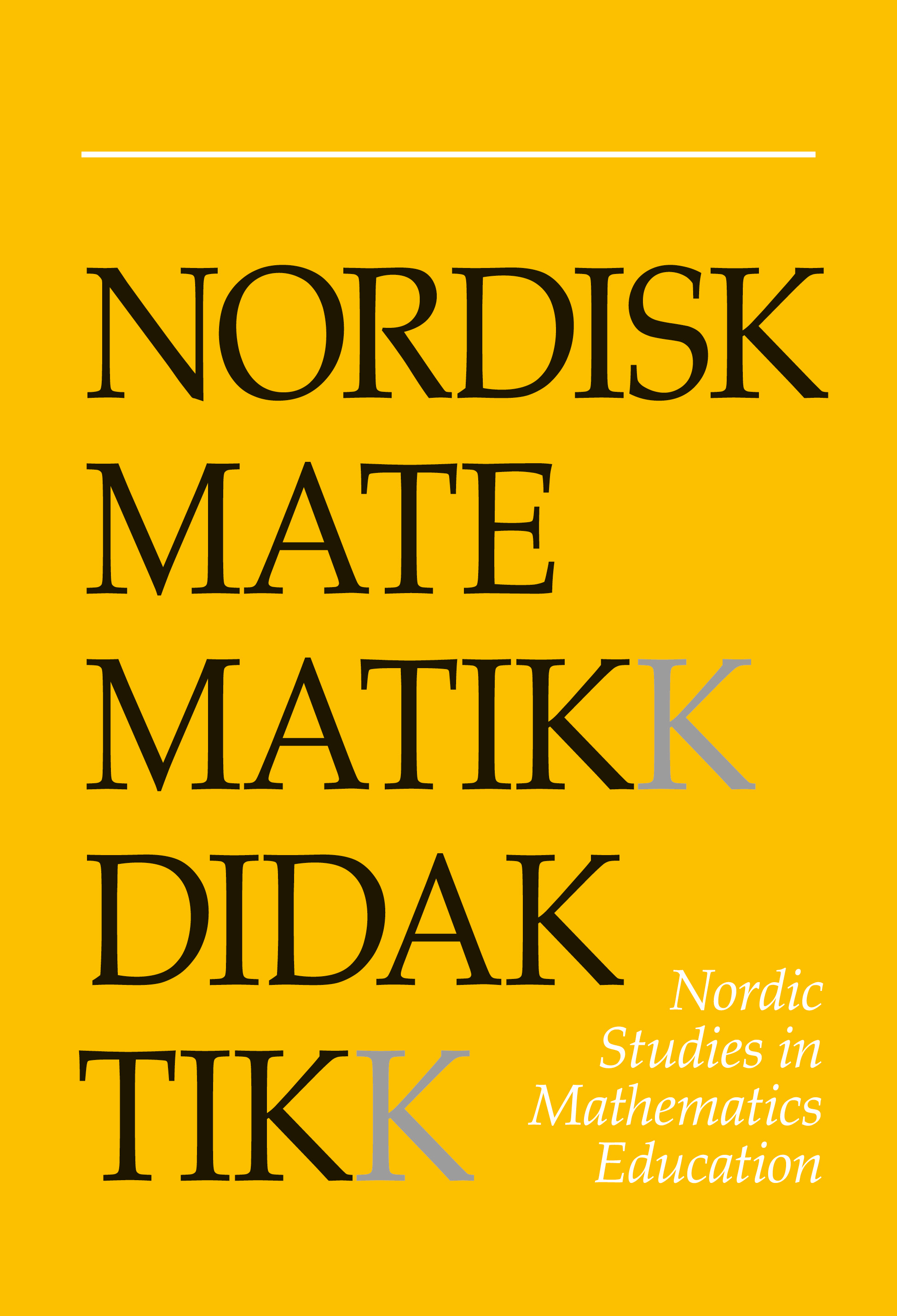
Vol. 26 No. 3-4 (2021)
Editorial
Camilla Björklund and Anna-Lena Ekdahl
Learning to teach mathematics in preschool through theory-driven interventionsInger Eriksson, Jenny Fred, Anna-Karin Nordin, Martin Nyman and Sanna Wettergren
Tasks, tools, and mediated actions – promoting collective theoretical work on algebraic expressionsJanne Fauskanger and Raymond Bjuland
Opportunities to learn ambitious mathematics teaching from co-planning instructionCharlotte Krog Skott, Louise Laursen Falkenberg and Ida Redder Honoré
New mathematics teachers’ learning when participating in induction on mathematics education – a case study of two lower secondary teachersPernilla Mårtensson and Anna-Lena Ekdahl
Variation theory and teaching experiences as tools to generate knowledge about teaching and learning mathematics – the case of pre-service teachersHanna Palmér and Jorryt van Bommel
Teachers’ participation in practice based research – a methodological retrospectAnna Ida Säfström, Björn Palmberg, Carina Granberg, Johan Sidenvall and Johan Lithner
Initiating teacher-researcher collaboration to support students’ mathematical problem-solvingAnita Tyskerud
Utvikling av matematikkundervisning – en kommognitiv analyse av rutiner i klasserommetMark Hoover and Deborah Loewenberg Ball
Practice-based research on the teaching of mathematics: progress and imperatives for the futureHamsa Venkat
Practice-based research on mathematics teaching: A developmental turn? -
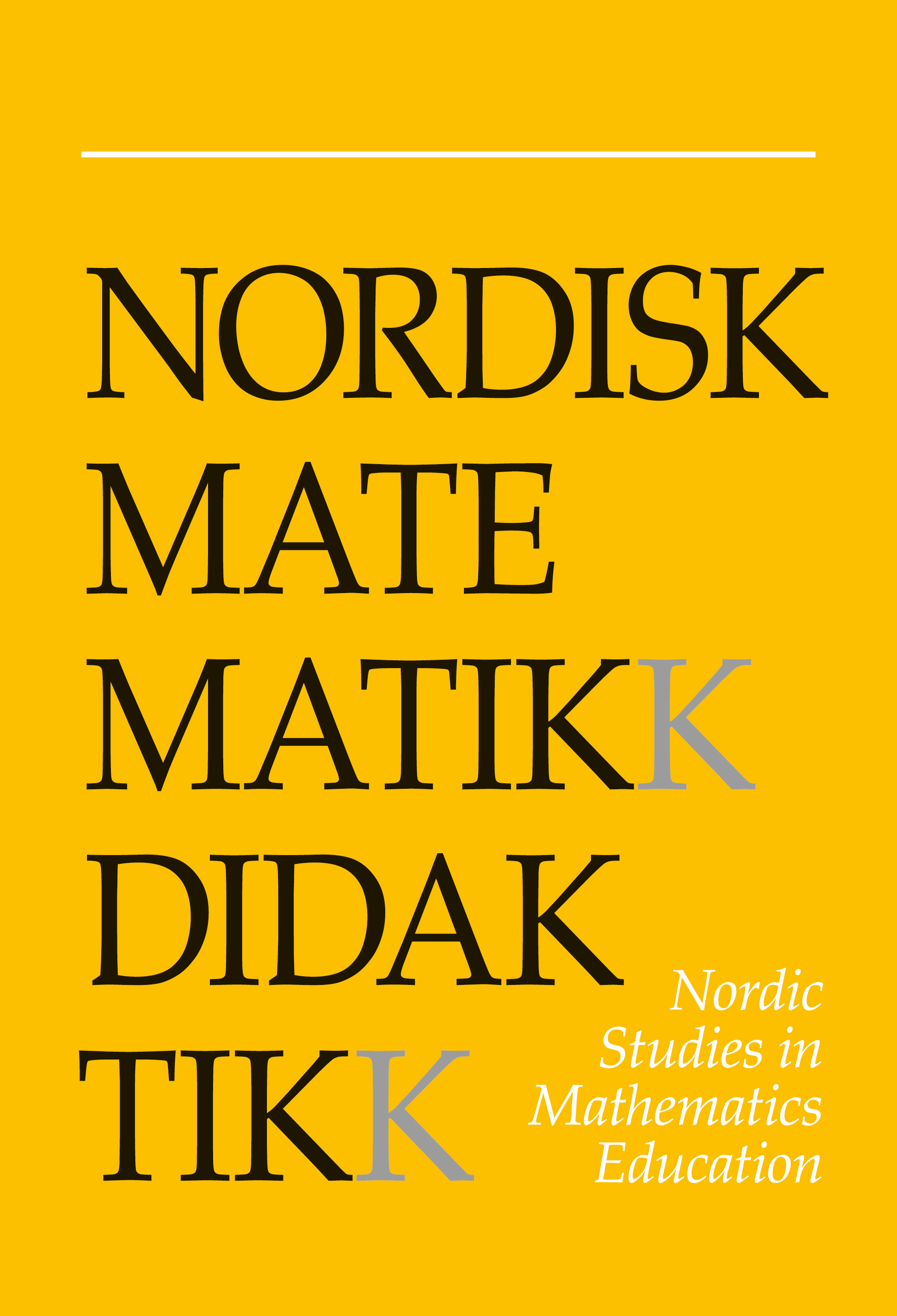
Vol. 26 No. 2 (2021)
Editorial
Dorte Moeskær Larsen and Morten Misfeldt
Fostering mathematical reasoning in inquiry-based teaching – the role of cognitive conflictsTomi Kärki, Jake Mcmullen and Erno Lehtinen
Designing a game-based environment for enhancing rational number knowledgeBeate Nergård and Kjersti Wæge
Effective mathematical communication in play-based activities: a case study of a Norwegian preschoolÅsa Wedin
Languaging in mathematics classrooms – space for students’ varied language repertoires in the Language introduction program in Sweden -
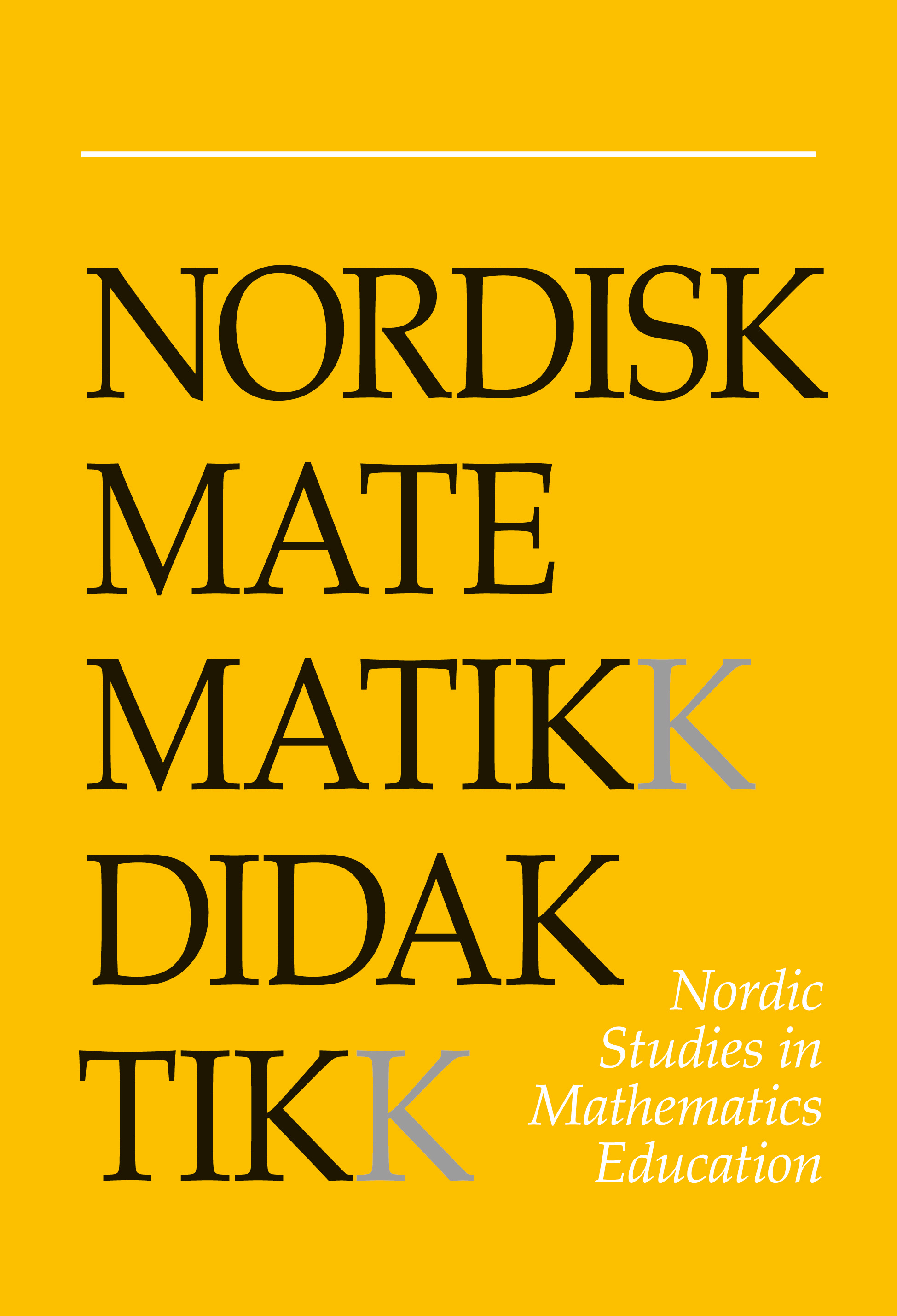
Vol. 26 No. 1 (2021)
Editorial
Malin Norberg
Exercise design in mathematics textbooks: the case of subtractionSusanne Johansson, Camilla Björklund och Anne Kultti
Att utmana barns taluppfattning i en matematikaktivitet i förskolanOve Gunnar Drageset
Exploring student explanations: What types can be observed, and how do teachers initiate and respond to them?Anita Valenta, Kirsti Rø, Reidun Persdatter Ødegaard og Marit Buset Langfeldt
Dekomponering av planleggingspraksis i en syklus av utforsking og utprøving i lærerutdanning abstract -
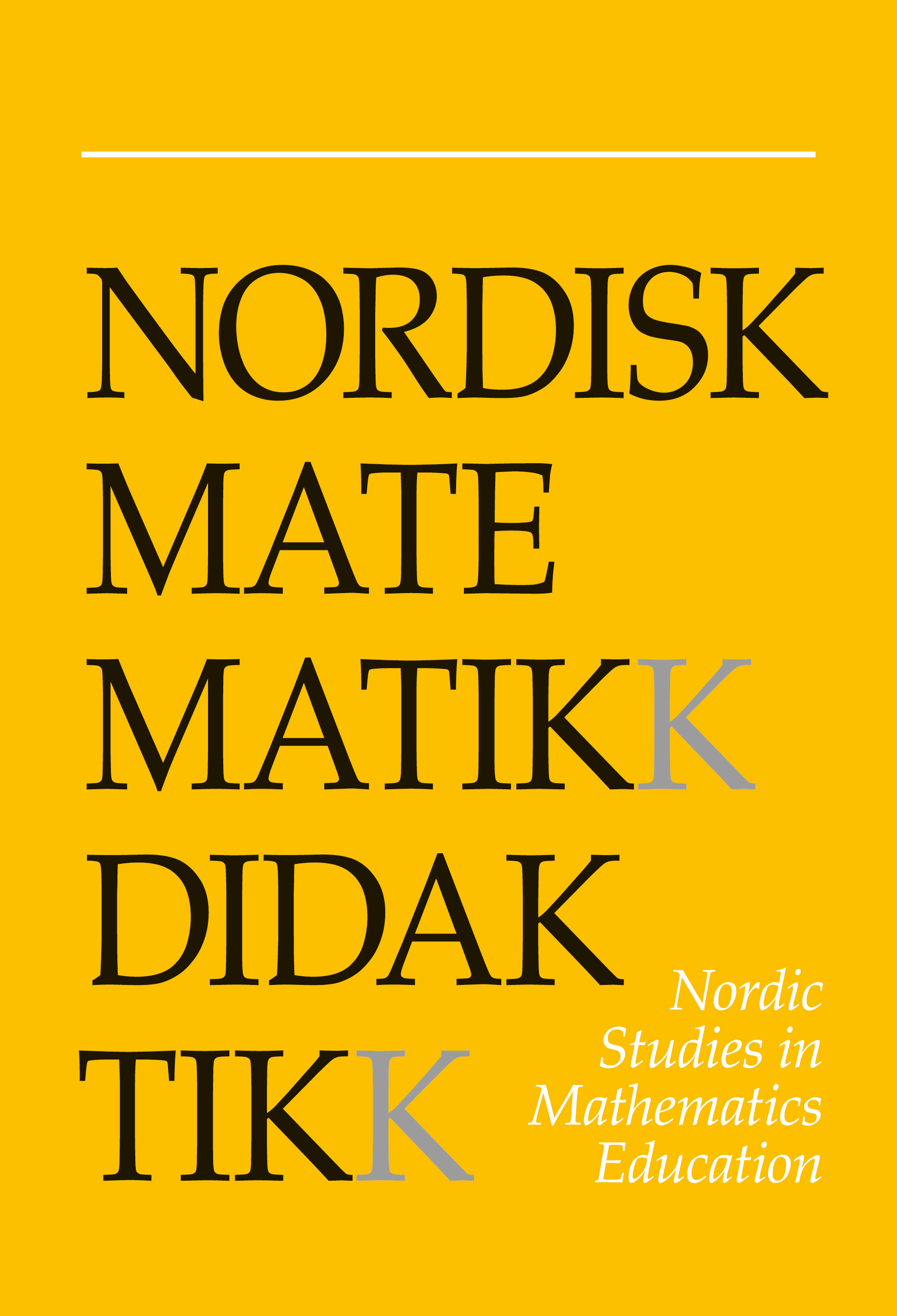
Vol. 25 No. 3-4 (2020)
Editorial
Lena Lindenskov and Pia Beck Tonnesen
A logical model for interventions for students in mathematics difficulties – improving professionalism and mathematical confidenceJuuso Henrik Nieminen
Student conceptions of assessment accommodations in university mathematics: an analysis of powerLeif Bjørn Skorpen
What the teachers and the students do and how they interact – a comparison of special education teaching and ordinary teaching in mathematicsCatarina Andersson
Formative assessment – from the view of special education teachers in mathematicsHelena Roos, Maria Lindfors and Anette Bagger
Educational settings in relation to special educational needs in mathematicsCecilia Segerby
Mind the gap between students and their mathematical textbooks -
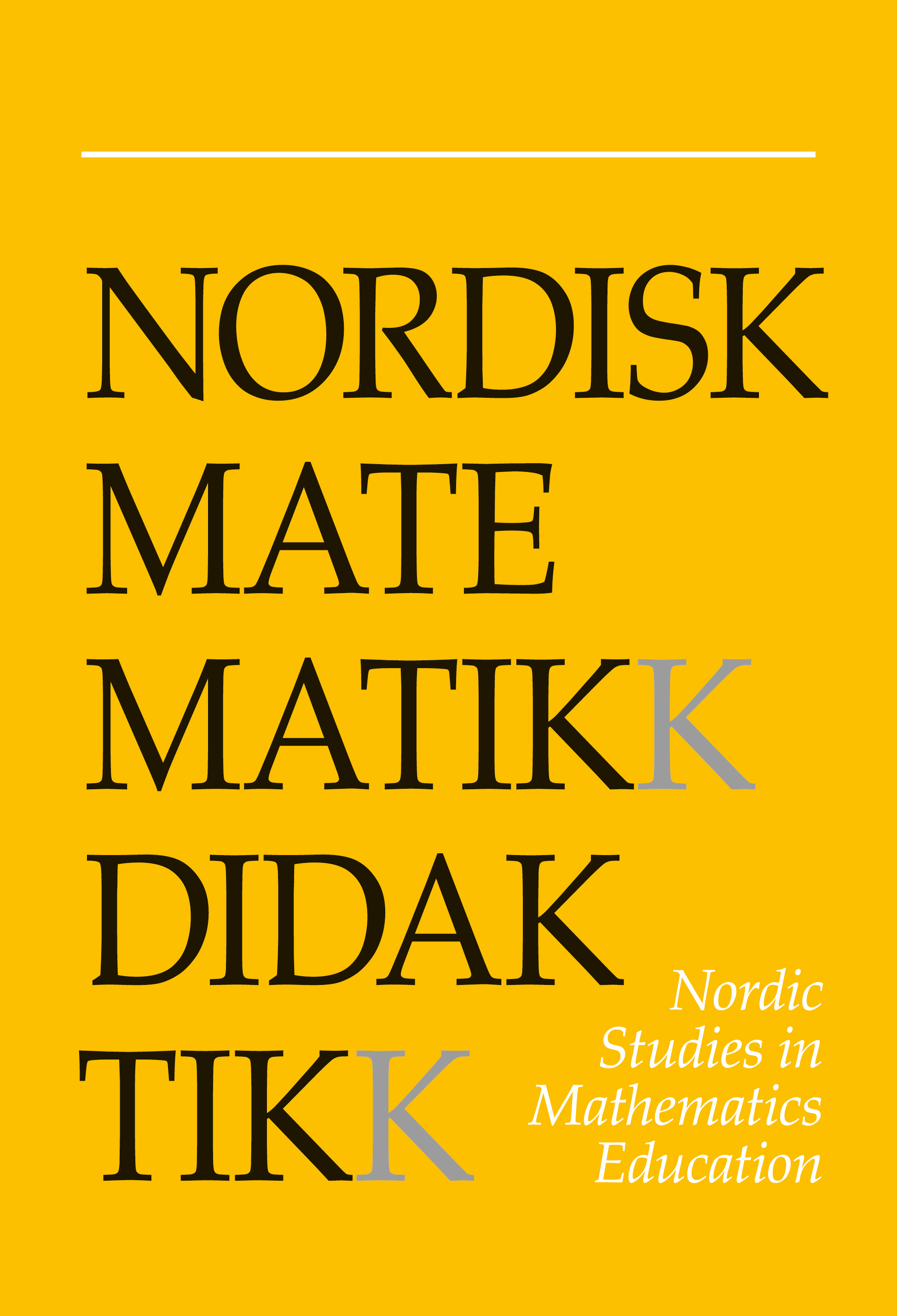
Vol. 25 No. 2 (2020)
Editorial
Natasja Steen, Matilde Stenhøj Madsen og Tomas Højgaard
Potentialer og begrænsninger ved anvendelse af lærebøger i matematikundervisningen: resultater fra et systematisk reviewPaul Andrews
Swedish primary teacher education students’ perspectives on linear equationsKristina Palm Kaplan and Johan Prytz
Conservative and transformative changes in algebra in Swedish lower secondary textbooks 1995–2015Ingi Heinesen Højsted
Guidelines for utilizing affordances of dynamic geometry environments to support development of reasoning competencyUffe Thomas Jankvist and Mogens Niss
Fostering an intimate interplay between research and practice: Danish ”maths counsellors” for upper secondary school -
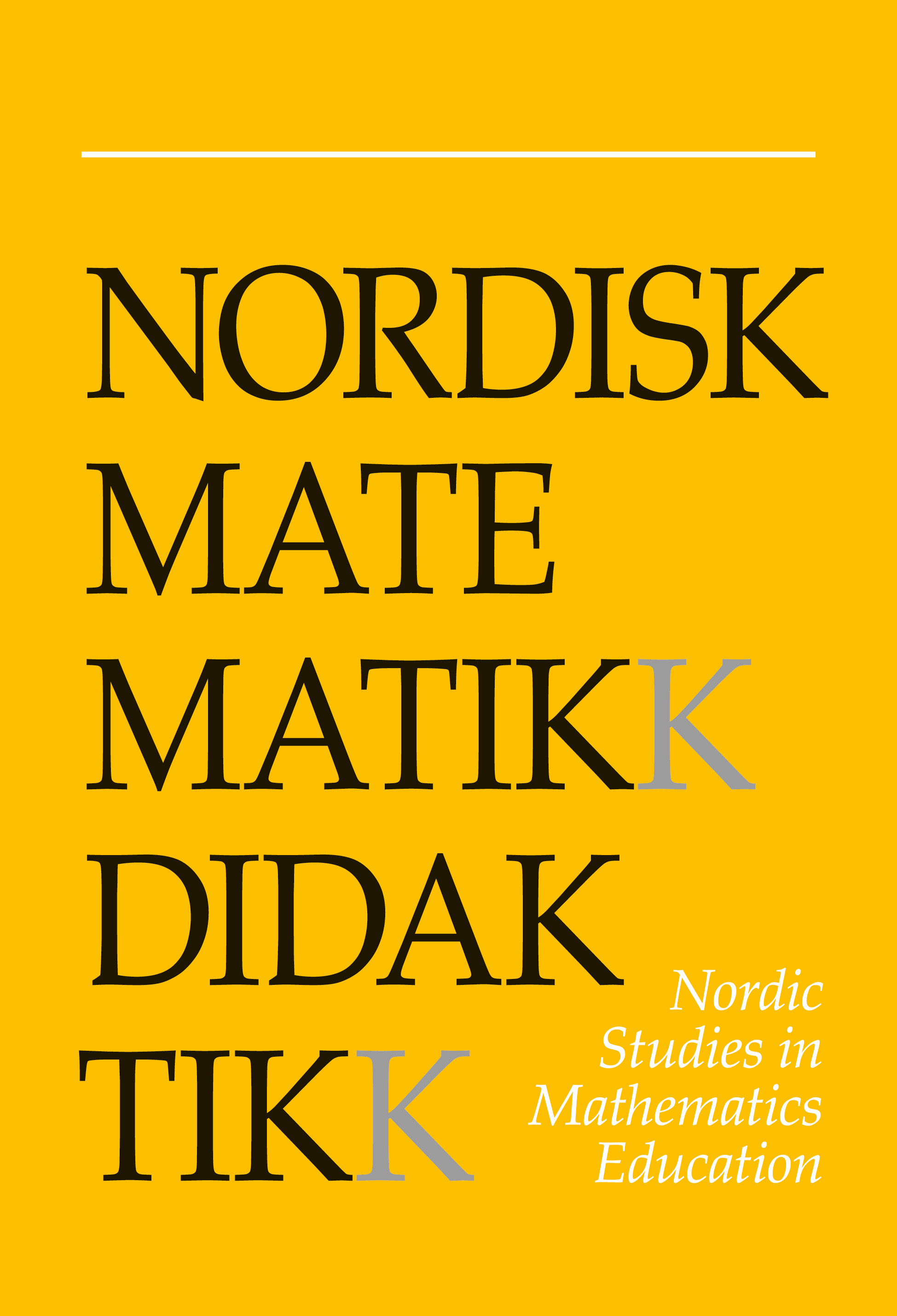
Vol. 25 No. 1 (2020)
Editorial
Camilla Sjölander Nordin
Avtryck i problemlösningsundervisning – en fenomenografisk studieRaimundo Elicer
Meanings of decision-making in probability and statistics: comparing Chilean and Danish upper secondary school curriculaHelge Fredriksen and Said Hadjerrouit
Exploring engineering students’ participation in flipped mathematics classroom: a discursive approachAnne Birgitte Fyhn og Håkon Robertsen
Kystfiskermatematikk og skolematematikk: to ulike perspektiver på hva ei méd erJenny Svanteson Wester and Angelika Kullberg
Understanding the relationship between length and area when changing the size of a two-dimensional geometric figure -
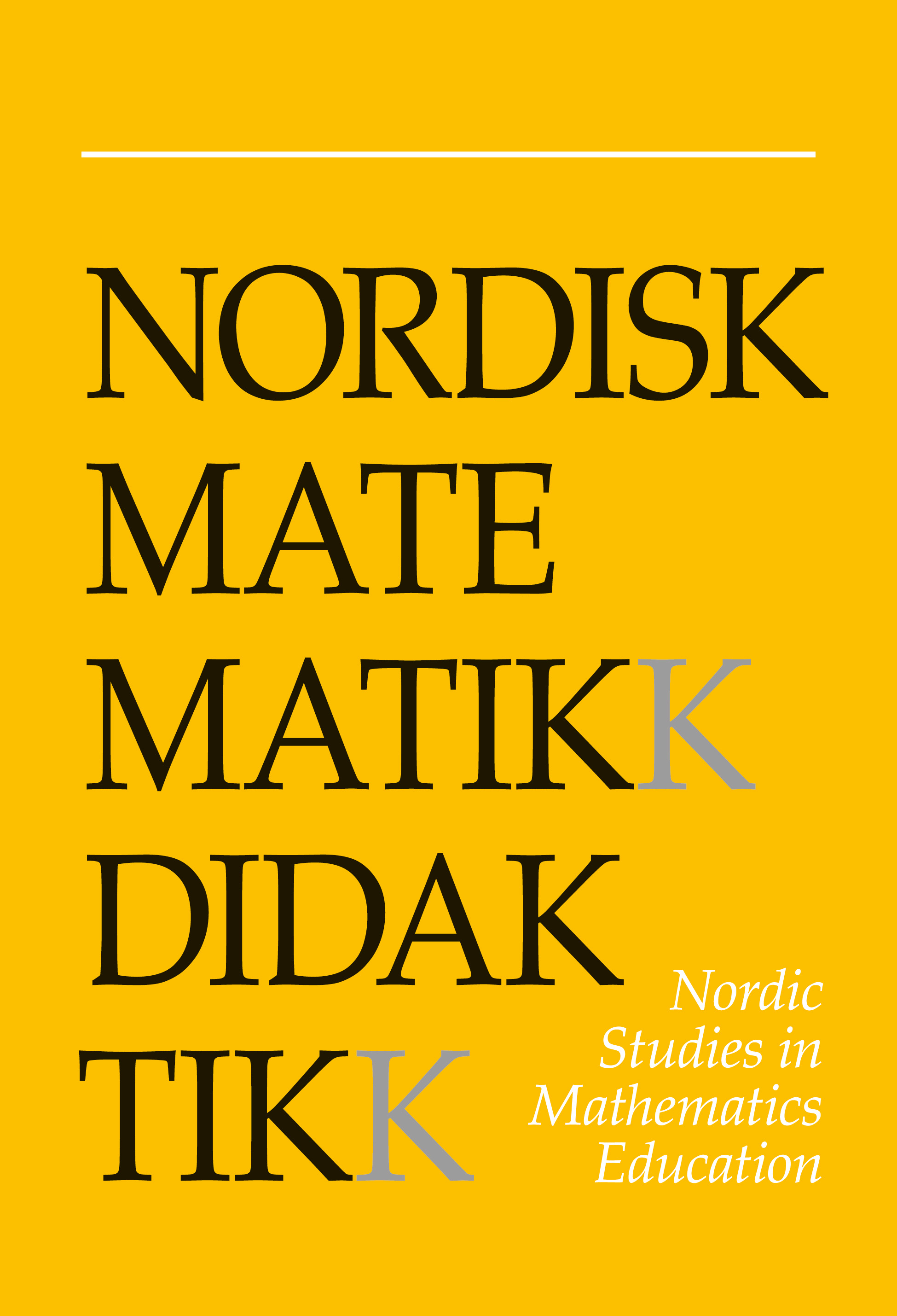
Vol. 24 No. 3-4 (2019)
Editorial
Thomas Kaas
Tilgange til tidlig algebraPeter Hästö and Riikka Palkki
Finnish students’ flexibility and its relation to speed and accuracy in equation solvingAnna-Maija Partanen and Pieti Tolvanen
Developing a frame for analysing different meanings of the concept of variable mediated by tasks in elementary-school mathematics textbooksInger Eriksson, Sanna Wettergren, Jenny Fred, Anna-Karin Nordin, Martin Nyman och Torbjörn Tambour
Materialisering av algebraiska uttryck i helklassdiskussioner med lärandemodeller som medierande redskap i årskurs 1 och 5Jenny Fred
Att designa för elevers deltagande i ett algebraiskt arbete – elever i årskurs 2 och 3 utforskar visuellt växande mönsterHelena Eriksson
Algebraic thinking and level of generalisation: students’ experiencing of comparisons of quantitiesCecilia Kilhamn and Ann-Sofi Röj-Lindberg
Algebra teachers’ questions and quandaries – Swedish and Finnish algebra teachers discussing practice -
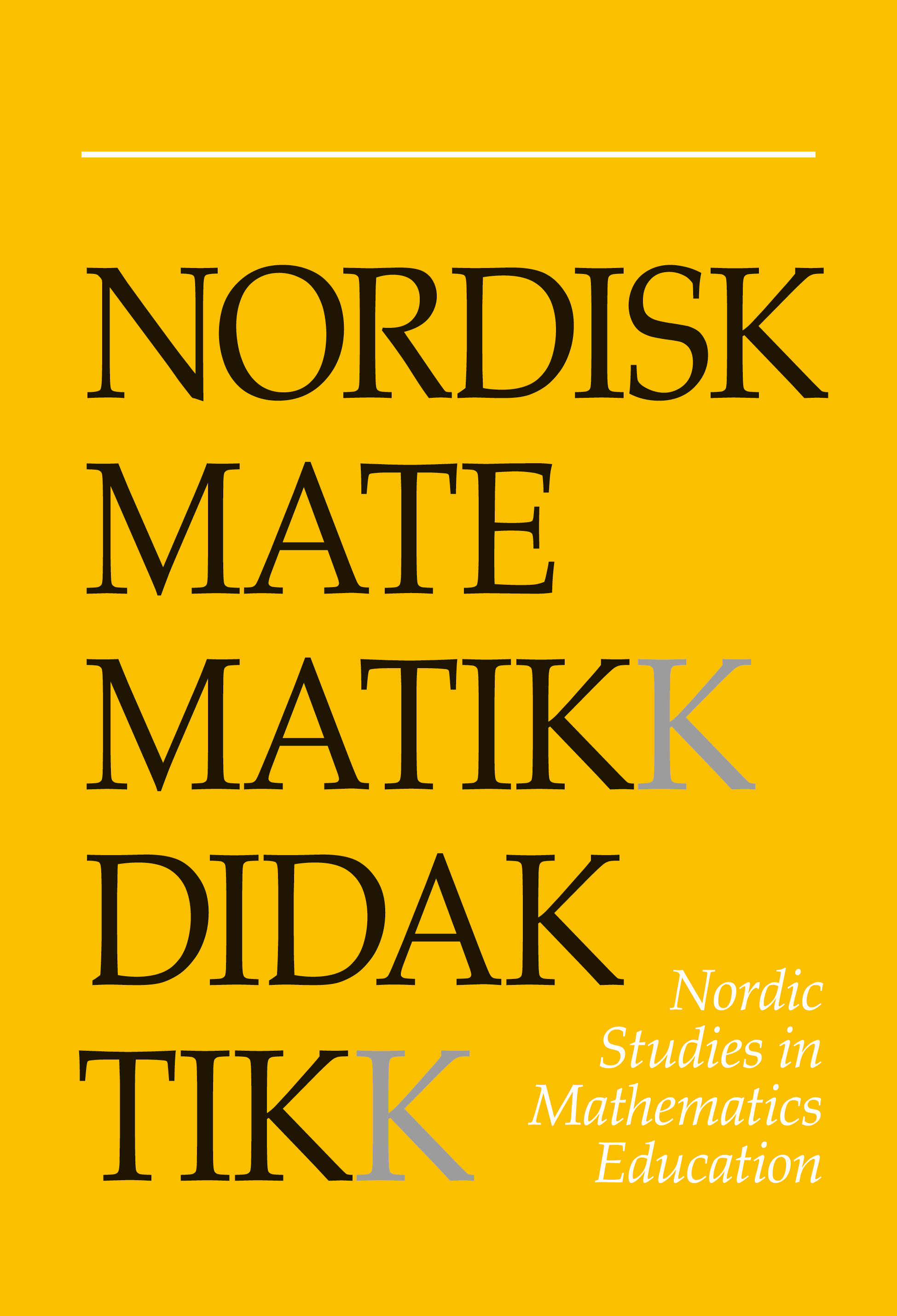
Vol. 24 No. 2 (2019)
Editorial
Trond Stølen Gustavsen and Olav Gravir Imenes
Investigating the fit of a model for students’ understanding of fractions in a Norwegian contextAbdel Seidouvy, Ola Helenius and Maike Schindler
Authority in students’ peer collaboration in statistics: an empirical study based on inferentialismSvanhild Breive
Engaging children in mathematical discourse: a kindergarten teacher’s multimodal participationKristina Juter
University students’ general and specific beliefs about infinity, division by zero and denseness of the number line -
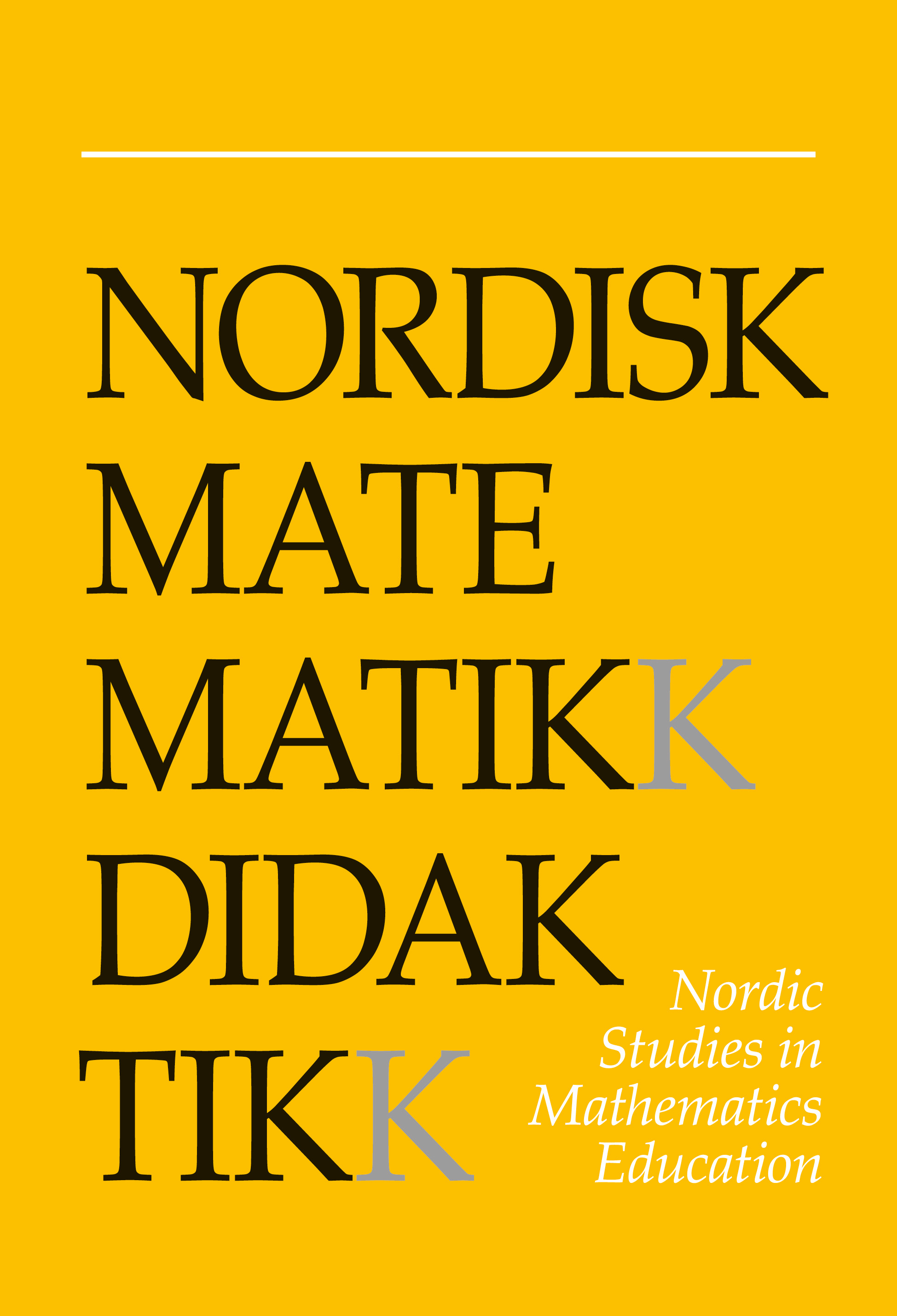
Vol. 24 No. 1 (2019)
Editorial
Annika Pettersson, Yvonne Liljekvist and Jorryt van Bommel
Studying concept elements as a way to trace students’ conceptual understandingKajsa Bråting, Lars Madej and Kirsti Hemmi
Development of algebraic thinking: opportunities offered by the Swedish curriculum and elementary mathematics textbooksJohan Sidenvall
Literature review of mathematics teaching design for problem solving and reasoningJanne Fauskanger
Ambisiøse undervisningspraksiser i Teacher time out -
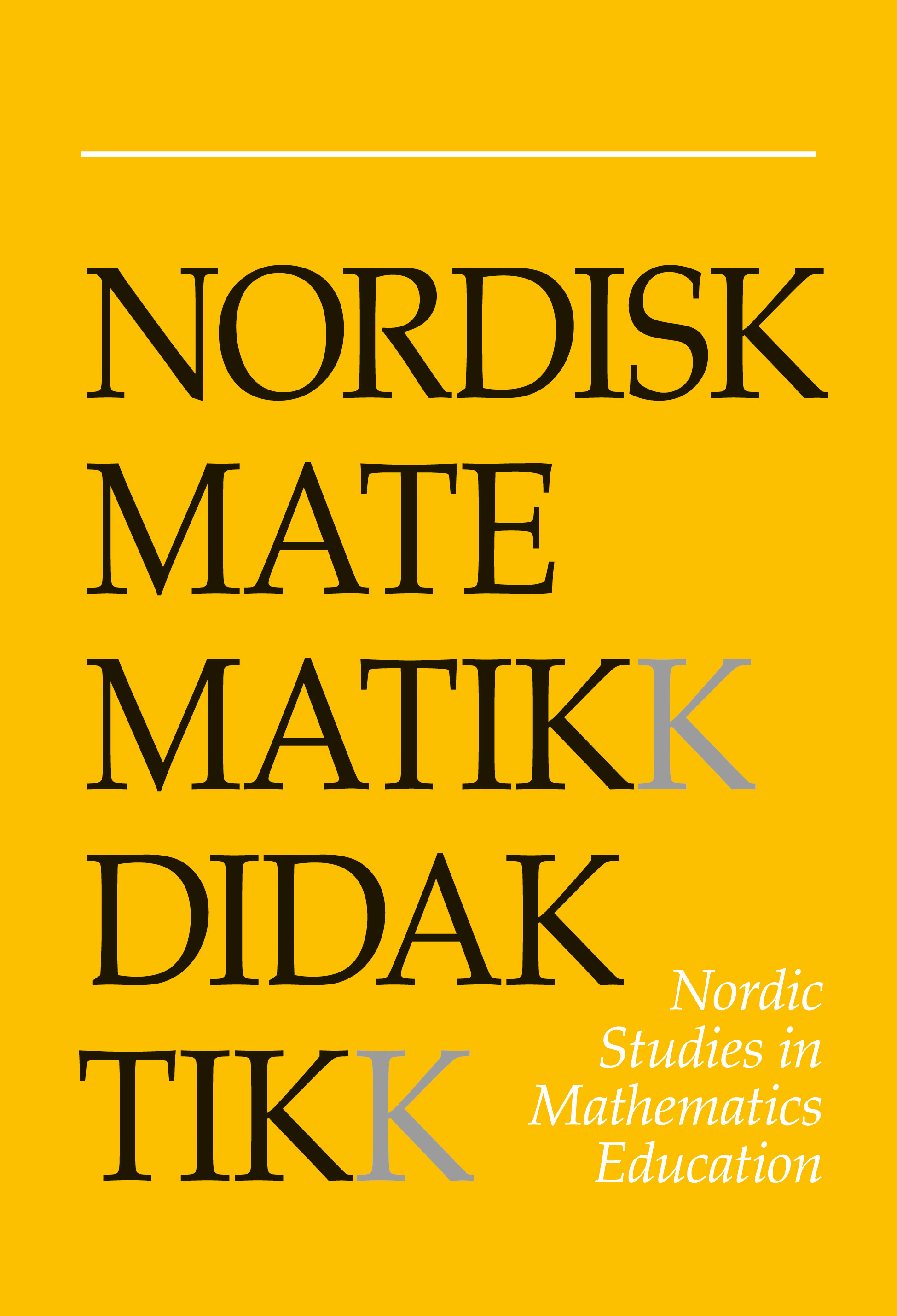
Vol. 23 No. 3-4 (2018)
Editorial
Tamsin Meaney and Toril Eskeland Rangnes
Language diversity in mathematics education in the Nordic countries 2008–2018Eva Norén and Petra Svensson Källberg
Fabrication of newly-arrived students as mathematical learnersPetra Svensson Källberg
Identity formations as mathematical learners in the context of transitionMarie Sjöblom
Developing mathematical reasoning by using questions in a multilingual mathematics classroomMaria Ahlholm and Päivi Portaankorva-Koivisto
The language factor – what exactly is it? Bilingual speakers of Russian and Finnish solving mathematical tasksJöran Petersson
Newly- and early-immigrated second-language students’ knowledge of arithmetic syntaxHilja L. Huru, Anna-Kaisa Räisänen and Anita Movik Simensen
Culturally based mathematics tasks: a framework for designing tasks from traditional Kven artefacts and knowledgeMette Hjelmborg and Ane Fleischer
En registeranalyse af centrale matematiske begreber i en grønlandsk kontekstAnne Birgitte Fyhn, Ellen J. Sara Eira, Ole Einar Hætta, Inga Anne Marit Juuso, Siv Ingrid Nordkild og Ellen Margrethe Skum
Bishop Sámegillii – utfordringer ved oversetting av matematikkdidaktisk fagterminologiDorota Lembrér
Polish parents’ views on mathematics activities at home and in Swedish preschoolsTroels Lange and Tamsin Meaney
Talking about mathematics in two languages: Can parental views inform the development of digital games for young children?Andrea Eikset and Tamsin Meaney
When does a difference make a difference? Teaching about language diversity in mathematics teacher educationSusanne Prediger
Multilingual issues in Nordic mathematics education – What is achieved and where to go next? -
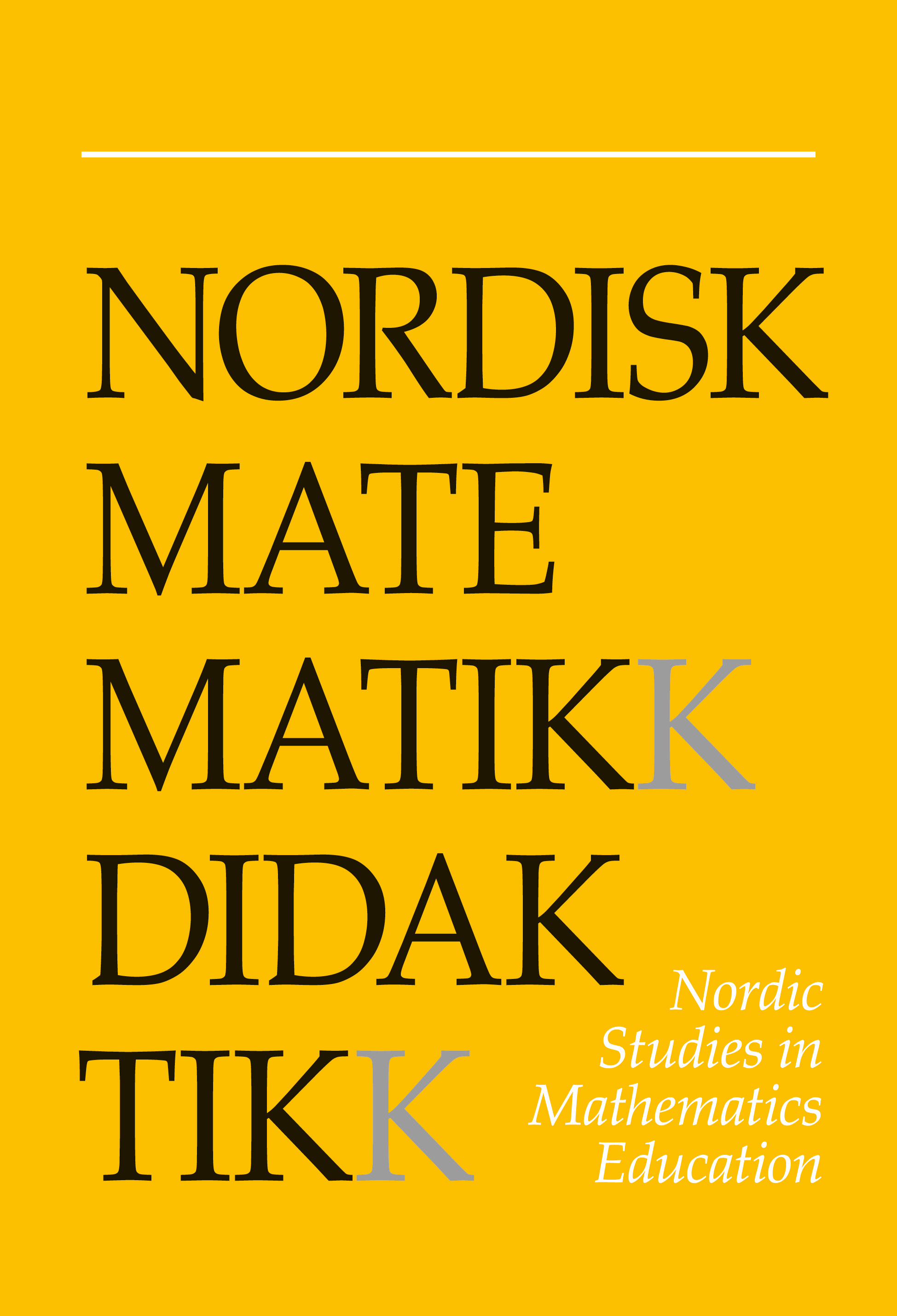
Vol. 23 No. 2 (2018)
Editorial
Jens Højgaard Jensen and Uffe Thomas Jankvist
Disciplinary competence descriptions for external useJan Roksvold
Læreres utbytte av kunnskap om hjernenAnita Tyskerud and Reidar Mosvold
Scrutinizing teacher-learner interactions on volume


